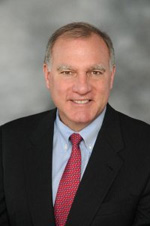 |
| Connecticut Attorney General George Jepsen |
Back in 2008, Indian generics maker Ranbaxy made a deal with AstraZeneca ($AZN) to launch its Nexium copycat in May of this year. So why are Americans still unable to buy cheap versions of the blockbuster heartburn pill, which brought in more than $2 billion in U.S. sales last year?
The FDA is under increasing pressure to answer that question, most recently from Connecticut's attorney general George Jespen. Last week, Jespen wrote the FDA urging the agency to either approve Ranbaxy's generic Nexium or to waive a mandatory 180-day waiting period that, under the provisions of the Hatch-Waxman Act, is preventing other generic drugmakers from jumping into the market.
Jespen's request was part of his response to a "citizen petition" filed in May by a law firm representing an unnamed generics manufacturer. Problem is, the FDA has banned Ranbaxy from shipping products from some of its plants, including the one expected to make generic Nexium. So, the agency hasn't approved Ranbaxy's application for the drug, leaving other companies that want to sell their versions in an indefinite holding pattern.
The delay irks Jespen, whose letter to the FDA said his state's health care plans have spent nearly $75 million on Nexium since 2012.
"The manifest result of this inaction is higher prices and a dead-stop bottleneck preventing more than a half-dozen generic drug manufacturers lined up behind Ranbaxy from entering the market," Jespen said in a press release.
Jespen added that the delay is further compounded by the fact that Ranbaxy and AstraZeneca are working together to manufacture and market branded Nexium--a provision that was part of their 2008 patent settlement. "Ranbaxy and AstraZeneca should be competing--instead, they are working together to defeat competition and harm consumers," Jespen said.
Drug industry critics have long contended that so-called pay-for-delay patent settlements harm consumers and the American health care system by pushing up drug expenses. And there's little doubt that Nexium is one of the biggest drivers of increased spending on prescription drugs: In April, Express Scripts' annual Drug Trend Report revealed that overall drug spending jumped 5% in 2013 and that Nexium was the priciest of what it called "traditional" drugs, costing the pharmacy benefits provider $23.76 per member per year.
Ranbaxy's manufacturing woes have only added to the hand-wringing over America's rising financial burden for brand-name drugs. The FDA banned products from the Ranbaxy plants because of fears that the company faked data on their drugs. In addition to delaying generic Nexium, the ban prevented Ranbaxy from introducing a cheap version of Roche's ($RHHBY) antiviral Valcyte, which lost its patent protection last year. In June, Ranbaxy finally won approval to market generic Diovan, Novartis' ($NVS) heart drug that lost its patent protection in 2012 but, thanks to Ranbaxy's delayed launch, still brought in $1.7 billion in sales for the Swiss drug giant last year.
- here's the Connecticut AG's release
- read more at the Hartford Business Journal
Special Report: Top 10 drug patent losses of 2014 - Nexium